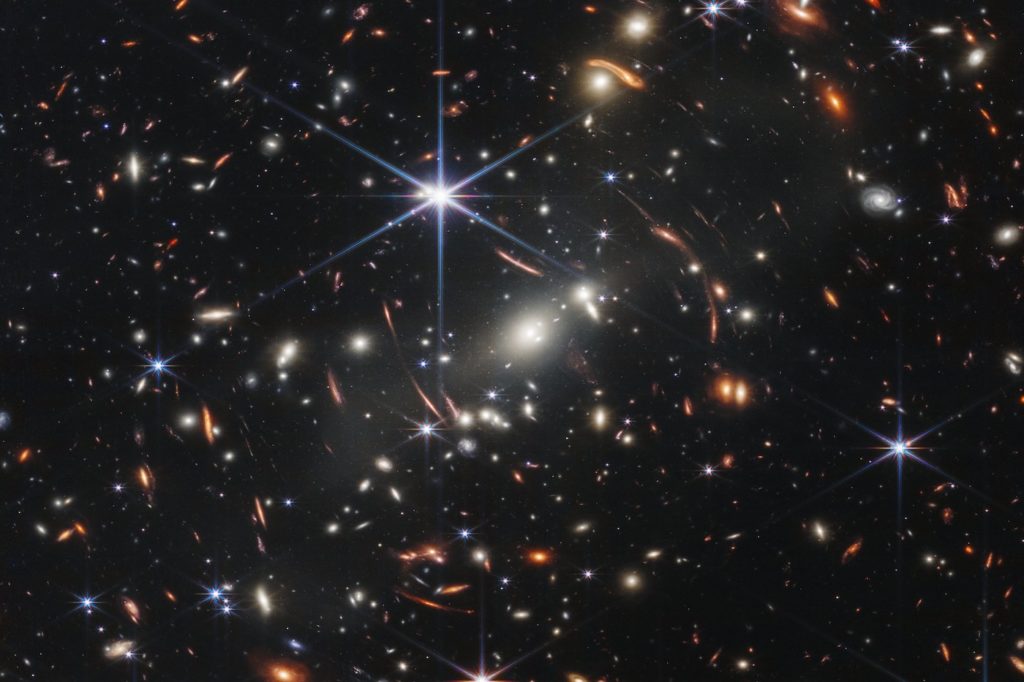As scientists have learned more about the universe’s massive scale, combined with the vast improbability that life could have been supported in it, they’ve had to develop theories to help explain these strange phenomena. Often their cosmological speculations about the origin of the universe intersect with philosophy and theology. Recent theories in cosmology that grapple with the scale and qualities of our universe propose that it is, according to cosmologist Bernard Carr, but one of “an ensemble of universes characterized by all conceivable combinations of initial conditions and fundamental constants”—in short, they propose what has come to be known as the multiverse.
Multiverse theories, however, are not universally accepted by cosmologists. Some argue that they can’t be verified by scientific method. Others dismiss them as mere metaphysical speculations. But what exactly is multiverse theory? Among the more famous of these multiple multiverse theories is one proposed by Max Tegmark of MIT. Tegmark thinks that every universe that can possibly exist actually does exist: “[T]here are infinitely many other inhabited planets, including not just one but infinitely many copies of you—with the same appearances, name and memories. Indeed, there are infinitely many other regions the size of our observable universe, where every possible cosmic history is played out.”
Multiverse theory emerges from the fact that our universe, against all odds, is hospitable not just to life, but intelligent life, as Carr observes. These initial “fine-tuned” conditions obviously raise difficult questions for scientists: does fine-tuning imply God? Or was it all due to chance?
But if multiverse theory raises philosophical quandaries for scientists, it raises equally confounding questions for theists: is monotheism compatible with multiverse theory? What about Christian revelation? These questions are the subject of an important new book by Jamie Boulding, The Multiverse and Participatory Metaphysics–A Theological Exploration (Routledge 2022). As Boulding notes, questions about the compatibility of multiverse proposals with Christian theology “have been largely defined (and constrained) by a persistent focus on whether the apparent fine-tuning of the physical constraints is evidence of divine design or a mindless universe.” Instead, he proposes a different approach, suggesting that there’s no fundamental incompatibility between the doctrine of creation and the multiverse.
Start your day with Public Discourse
Sign up and get our daily essays sent straight to your inbox.If multiverse theory raises philosophical quandaries for scientists, it raises equally confounding questions for theists: is monotheism compatible with multiverse theory? What about Christian revelation?
Boulding’s central claim is that, rather than focus on the question of divine design and the initial conditions of the universe, “a participatory account of the relationship between God and creation argues for greater continuity between theology and the multiverse proposal.” In other words, he thinks that an appropriation of a traditional philosophical account of the relationship between God and the world can aid in bridging what to many is a wide gap between current cosmology and theology. The book constructively engages with multiverse theories and argues that the metaphysics of participation—“a relational structure whereby beings share to varying degrees in a perfection received from a source that itself embodies the fullness of that perfection”—can help us understand multiverse theories.
This framework also points to compatibility between multiverse theories and traditional Christian theology. In Christianity, participation plays an important role in what it means to be created: the understanding that the relationship between creatures and God is a sharing of “being with the perfect source of being, God.” Again, Boulding writes: “The fundamental idea is that everything in existence comes from, shares in, is sustained by, remains utterly dependent on, and participates in God’s own existence.”
To determine whether multiverse theory and Christianity are compatible, Boulding reviews what Plato, Thomas Aquinas, and Nicholas of Cusa say about participation and explores how their views could apply to contemporary multiverse theories. Today’s scientists are drawn to multiverse theories to make sense of multiplicity, diversity, and infinity. But for Boulding, Plato provides a way to understand multiplicity in the cosmos; Thomas Aquinas explains diversity of things; and Nicholas of Cusa gives an analysis of infinity. Their insights can help us evaluate various multiverse theories from both physical and philosophical perspectives.
Boulding thinks that Nicholas of Cusa’s writings can illuminate infinite time and space, which are features of the multiverse. For Nicholas, there is a non-contrastive difference between any notion of infinity in the order of created things and a primal sense of infinity predicated of God. So, when contemporary multiverse theories embrace a notion of infinity, they need not be seen as competing with divine infinity.
Plato’s insights into the idea of perfection are especially helpful in grappling with the fact of multiplicity. He explains the relationship between the realm of Forms (unchanging being—for example, the idea of a Tree), and the Forms’ many manifestations in our mutable world (the many trees that grow and die). When Thomas Aquinas develops his idea of creation, he goes beyond Plato’s views, claiming that to be created is to be caused to exist, an analysis rooted in his distinction between what a thing is (its essence) and that it is (its existence). It is only God in whom existence and essence are identical; all creatures exist by participating in that perfect existence that is God. To be created is to be a being “by participation,” and here Thomas adopts a Platonic notion of a hierarchy of being in which there are degrees of perfection. As Thomas also says, any existing thing, “the existence of which is other than its nature,” must “have its existence from some other thing.” So, whatever multiverse or universes there are, each is created, that is, each has “being by participation.”
The crucial issue with creation for Thomas Aquinas is not design, but rather the issue of existence and the participation of all things in the perfection of Being that is God. There is a distinction here that is important: for Thomas, God is not at the summit of a hierarchy of being; rather, God is a kind of ultimate or foundational cause of all that is. Not only the very existence of creatures, but their various perfections—their truth, their goodness, their beauty—all reflect the infinite perfection of God.
Created reality as created, in whatever form or forms it takes, is ultimately one because it comes from the Creator’s act. The oneness of the created order encompasses any amount of multiplicity and diversity. All things that exist are beings. Each manifests what it means to be in diverse ways, but “being” itself is one. As Thomas notes, “being” is an analogical term. The being of a subatomic particle and the being of a dog differ in that what it means to be a subatomic particle is very different from what it means to be a dog. Yet, it is true to say that each thing does “be,” which means that there is a single common, albeit analogical, sense of being. For Thomas, there is yet a further analogical sense of being when one refers to God as infinite being: a Being, in a sense, beyond or above all beings.
Appeals to the metaphysics of participation allow Boulding to argue that multiverse proposals do not really call into question Christian theology’s understanding of God. Infinite multiplicity and diversity do not challenge the claim that all that is is created.
Furthermore, it seems to me that the so-called plurality of universes found in such multiverse theories does not really contradict Aristotle’s claim in On the Heavens that “there is not now a plurality of worlds, nor have there been, nor could there be. The world is one, solitary and complete.” Aristotle may never have imagined the great diversity that the modern sciences have disclosed, but the fundamental principles of his metaphysics—and indeed of his natural philosophy, as developed by Thomas Aquinas—remain excellent ways to understand what the natural sciences tell us.
To refer to the multiverse, using the definite article, allows us to speak intelligibly of an ensemble of universes (notice the singular “an”). When we ask what it means for things to exist in a metaphysical sense, we can see the common features that bind the multiverse together. In the universe in which we find ourselves, the great diversity of things from subatomic particles to galaxies can all be understood in the terms that metaphysics (Thomistic or otherwise) gives us: substance and accident, act and potency, and the like—not to mention that they are created.
Even if we were to reject the specifics of the Thomistic metaphysics of participation and its Platonic and Aristotelian roots, we cannot avoid the recognition that there must be some common metaphysical features that are at the basis of whatever universe or universes there are. After all, multiplicity always presupposes some kind of overarching unity.











